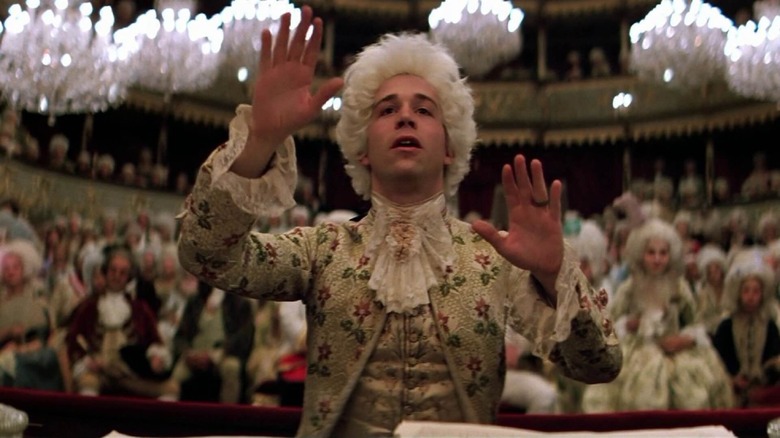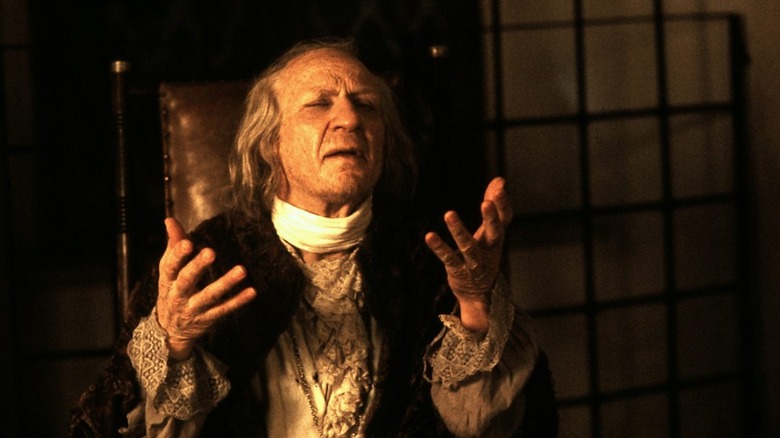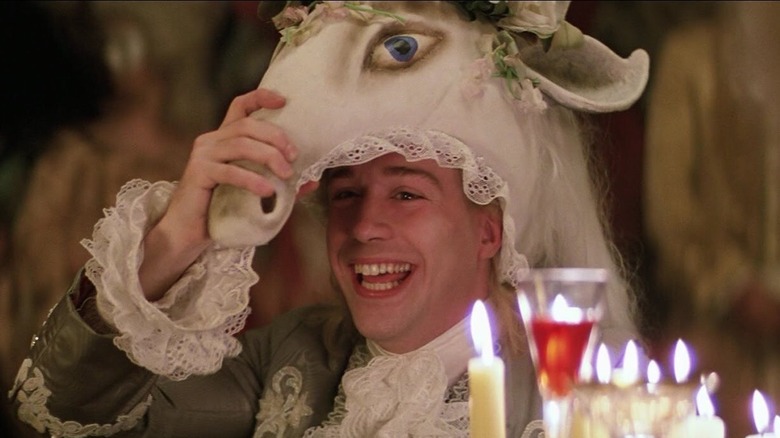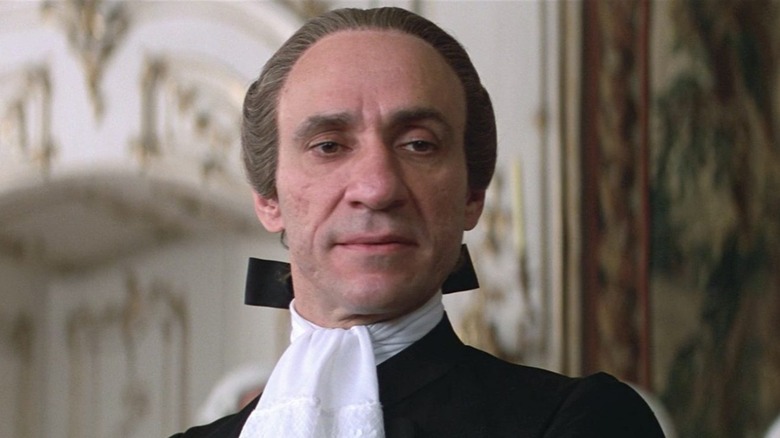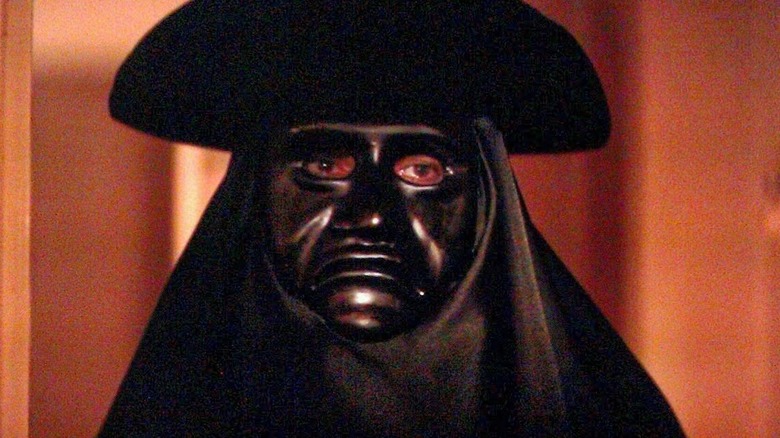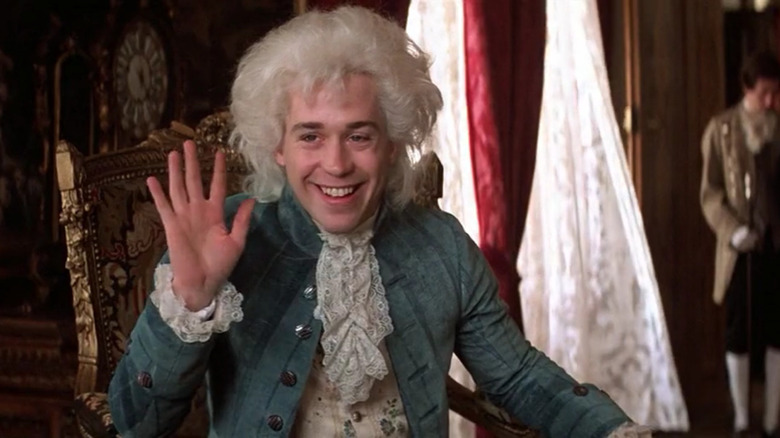The True Story Behind Amadeus (And Why It Changed For The Screen)
It is one of the most famous stories in music history: The divinely talented Wolfgang Amadeus Mozart falls foul to the murderous schemes of Antonio Salieri, a mediocre court composer driven wild with jealousy by the young maestro's God-given gifts. This is the tale told by Milos Forman's Oscar-winning "Amadeus," probably the most popular movie ever made about classical music and, I'll bet, where many people have derived their knowledge of Mozart's life and works.
Yet the juiciest details of the story are almost entirely made up; the old saying that truth is stranger than fiction proves just the opposite in this case, and many of the Machiavellian plot points are flourishes from the pen of celebrated playwright and screenwriter Peter Shaffer.
That is not to diminish the accomplishments of Mozart's short life. He was known across Europe as a musical prodigy at an early age, having played for King Louis XV of France at the age of 8, and composed his first opera when he was only 12. Before his untimely death at 35, he produced an incredible body of work boating over 600 compositions across symphonic, chamber, operatic, and choral music. Even if someone claims to have no knowledge of classical music, they probably know Mozart's tunes, sampled by everyone from Evanescence to Tenacious D and regularly popping up in TV commercials.
How did Mozart's life become intertwined with the dastardly schemes of Salieri for eternity? Let's take a look at the real story and how it stacks up against Forman's multi-award-winning historical extravaganza.
So what happens in Amadeus again?
It is 1823, and court composer Antonio Salieri (F. Murray Abraham) is committed to a psychiatric ward after a suicide attempt, claiming he has murdered Wolfgang Amadeus Mozart (Tom Hulce). A priest is summoned to hear his confession and, in flashback, Salieri tells the story of how he once made a pact with God to make him famous in return for his piety.
Salieri, a respected composer of Emperor Joseph II (Jeffrey Jones) in Vienna, was appalled when his limited abilities were quickly overshadowed by the sublime music of the vulgar upstart, Mozart. Seeing it as a slight from God, Salieri renounces his religion and sets his sights on destroying the young maestro. Mozart suffers from ill health brought about by his boozing and carousing, and, when Salieri learns of the death of the young man's father, he devises a terrible scheme. He will lead him to believe that his deceased dad has risen from the grave to commission a requiem, and pass off the piece as his own after he murders him.
While "Amadeus" is nominally a biopic of Mozart, it is very much the story of Salieri, reflected in the fact that Abraham won the Oscar for Best Actor while Hulce made do with a nomination. Indeed, Mozart is almost a side character as we see much of the story from Salieri's point of view, and Abraham is phenomenal in the role. Just take the scene when Salieri disbelievingly scans Mozart's drafts and declares "Here again was the voice of God!" He's a complex villain who is in awe of Mozart's talent but is driven by jealousy to take him down.
Was Mozart really an idiot savant as portrayed in the film?
In "Amadeus," Tom Hulce portrays Mozart as a childish, giggling fool with a potty mouth and a penchant for flamboyant candy-color wigs. This only adds to Salieri's sense of injustice as he feels that, as a devoutly religious man, he is far more deserving of God's ability to dish out musical talent. This portrayal upsets many music historians, including Federico Cortese, a senior lecturer at Harvard who dispelled the myths for Newspaper Alum.
"What I find absolutely inadequate is the idea that he [Mozart] was a kind of idiot-savant. On the contrary, one of the most extraordinarily impressive things about him is how he could understand the corners of human feelings, even at a rather young age. He must have been hypersensitive and therefore emotionally very vulnerable: certainly very aware of everything that was going on around him.”
In reality, Mozart was far more hard-working than his reputation suggests. It was commonly accepted that he could compose entire masterpieces in his head and jot them down later. This is hinted at in the scene where Salieri unveils his "March of Welcome" to greet Mozart, only for the young composer to effortlessly improve it after only hearing it on the way into court. Works such as the "Linz Symphony," put together in only four days, support this notion, but it was later realized that Mozart drafted out his pieces just like anyone else.
As for his childishness, Mozart's letters reveal that he had a bawdy and sometimes scatological sense of humor. He even composed a piece called "Leck mich im Arsch," which probably needs no translation. However, historians have noted that these kinds of yuks were common in middle-class Viennese society at the time, and not specific to Mozart.
Did Salieri really murder Mozart?
The real Antonio Salieri suffered from dementia in his old age and was committed to medical care after attempting to slash his own throat, but he spent the last few years of his life claiming he had poisoned Mozart. While the composer wrote in a letter to his wife that he thought he had been poisoned, there is little evidence to support this. A wide array of possible causes have been put forward, with the most likely culprit being a strep infection. Is it possible that Salieri heard the poisoning rumor and latched onto it in his senility?
A few years after Salieri's death, Russian writer Pushkin penned a play called "Mozart and Salieri," which ran with the idea that Salieri poisoned his supposed rival. The myth gained further traction when Rimsky-Korsakov used Pushkin's play as the basis for his opera of the same name. 80 years on, Peter Shaffer turned the story into his Tony Award-winning play, which he later adapted into the screenplay for Milos Forman's lavish film, forever immortalizing the tale of Salieri's murderous envy.
Historians place little credence in the notion that Salieri killed Mozart. In real life, the two composers had a cordial, if at times prickly, professional relationship. Unlike the solitary, pious Salieri in the film, the real Salieri was a far more tragic character whose wife and son both died. There is also evidence that Salieri attended Mozart's opera, "The Magic Flute," and raved about the work to the composer afterward. It's also been documented that Salieri also tutored Wolfgang's young son in music, which seems odd behavior for a supposed rival.
Did a mysterious stranger really commission Mozart's Requiem?
In "Amadeus," Mozart has a difficult relationship with his father, Leopold, and composes "Don Giovanni" after his death. Salieri sees the opera and thinks it's a work of genius, but also detects the composer's guilt toward his father in one of the characters. This leads him to his master plan: He buys the same costume Mozart bought for his dad when he first arrived in Vienna and pays him a visit wearing it, commissioning a requiem. Mozart is shocked by the appearance of the mysterious figure that reminds him of his father, but he's flat broke so accepts the gig anyway. Salieri confesses that he planned to kill Mozart once "Requiem," the piece, was complete and claim it as his own work.
This deception is one of the most dramatic plot points in "Amadeus," giving us the full scope of Salieri's meticulous scheming and cruel intentions towards his hated rival. Yet, once again, it didn't happen that way in real life. Mozart did receive a commission from an "unknown, grey stranger" who represented an anonymous client who wished him to write a Requiem, but the mysterious client was Count Franz von Walsegg-Stuppach, who wanted to use the music to commemorate his late wife. The Count already had a history of passing off other people's compositions as his own, and it took Mozart's widow ten years to persuade him to acknowledge Wolfgang as the true author of the piece.
As in the film, Mozart died before he could complete the work, but it was his student Franz Xaver Süssmayr who completed it rather than Salieri.
Do the liberties taken help or hinder Amadeus?
Mozart was a hard-working composer with an ear for a great tune, had a decent relationship with Salieri, and almost certainly wasn't murdered. Where does that leave us regarding "Amadeus?" Would a straight biopic of Mozart's life have reached the same heights? It would certainly be possible in the hands of a director like Milos Forman, but it is equally likely that it would have gone the same way as "Immortal Beloved," the largely forgotten Beethoven biopic starring Gary Oldman several years later.
As a film, "Amadeus" is one of the most purely entertaining biopics ever made. Two-and-a-half hours fly by in a whirl of luscious costumes and set design, classic scenes, and incredible music. The addictive drama is driven by the dynamic between Tom Hulce and F. Murray Abraham's unforgettable performances; Hulce's Mozart is giddy, effervescent, and flush with the joys of life, his free-spirited nature defined by that ridiculous laugh. Meanwhile, Abraham fully embraces the covetous Salieri, presenting a grave, courtly man whose devils get the better of him. The actor does incredible work with just fleeting emotions playing across his face as Salieri wrestles with his wonderment at Mozart's work and his burning hatred.
The film was a hit and won eight Oscars including Best Picture, Best Actor (Abraham), and a second Best Director award for Forman (after "One Flew Over the Cuckoo's Nest"). It also got people listening to Mozart, with its soundtrack selling 6.5 million copies and becoming one of the best-selling classical music albums of all time. Historians might get riled up about the liberties it takes, but with the movie currently occupying a spot in IMDb's Top 100, I'm all for a popular movie that still turns people onto the life and works of a great composer.
